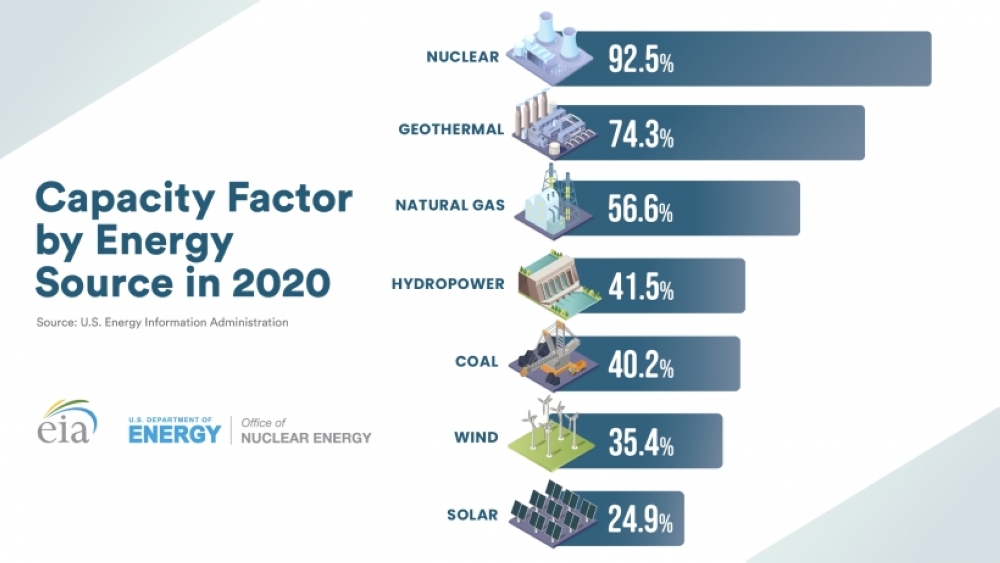

The world prefers nuclear power because it delivers low-cost and carbon-free clean energy. It is reliable and deployable on a large scale. It has highest capacity factor compared to any other energy source. At 28 per cent it is the world's second largest source of low-carbon power.
Around 440 nuclear power reactors produce almost 10pc of the world’s electricity demand. In 2020 nuclear plants supplied 2,553 TWh of electricity, down from 2,657 TWh in 2019. Prior to 2020, electricity generation from nuclear energy reactors increased for seven consecutive years, according to World Nuclear Association [WNA] data.
In 2020, 13 countries produced at least one-quarter of their electricity demand from nuclear plants. France produces almost three-quarters of its electricity from nuclear power plants. Slovakia and Ukraine get more than half from nuclear. Hungary, Belgium, Slovenia, Bulgaria, Finland and Czech Republic get one-third or more. South Korea produces more than 30pc of its electricity from nuclear plants. The US, UK, Spain, Romania and Russia produce around one-fifth of their electricity from nuclear plants.
According to International Energy Agency, the world produced 22,044 TWh of electricity in 2019. Coal-fired power plants topped the total electricity produced from all sources with 36.7pc followed by gas 23.5pc, hydro 16pc and nuclear 10.3pc. Solar, wind, geothermal and tidal sources produced 8.2pc, oil 2.8pc and others 2.6pc.
Coal-fired power plants are a non-renewable energy source. They severely impact the environment. Coal is not a clean energy source unlike nuclear, gas, solar, wind, biomass and geothermal. Coal combustion emits sulphur dioxide (SO2) and nitrogen oxide [NOx]. The first triggers acidic rain and the latter causes smog and respiratory diseases.
The world looks at green energy sources because of the environmental and health risks linked to coal-fired power plants. Nuclear power plants do not pollute the air like coal-fired plants.
Nuclear plants have high-capacity factor, meaning, producing maximum power more than 93pc [see graphic] of the time during the year. It is around 1.5 to 2 times more as natural gas and coal units and 2.5 to 3.5 times more reliable than wind and solar plant. However, nuclear power plants produce radioactive waste, coal plants do not. Nuclear reactors need strict safety precautions.
Although globally around 55 more reactors are under construction, equivalent to approximately 15pc of existing capacity, many countries have closed nuclear power plants.
Many countries have phased out nuclear power plants or are in the process of energy transition to renewable sources such solar, hydro and wind. This follows the Paris Agreement signed in 2015. The Agreement is an international treaty on climate change. At the 21st Conference of Parties or COP21 in Paris 196 parties adopted the Agreement that came into force on November 4, 2016. It aims to limit global warming to well below 2, preferably to 1.5 degrees Celsius, compared to pre-industrial levels.
Running a nuclear power plant is risky. Many governments are apprehensive after the Fukushima Daiichi nuclear disaster in 2011 and the accident on April 26, 1986 at the No. 4 reactor in the Chernobyl Nuclear Power Plant, near the city of Pripyat in Ukraine.
From January to November 2021, there were five nuclear power station shutdowns and 11 permanent shutdowns in 2019. Despite the Fukushima disaster, 33 nuclear reactors were running in Japan in 2021.
Countries should decide which source of energy is good for them. Whether clean, reliable and safe for their needs and at the same time, does it abide with climate change goals for the greater good of the world? It is a dilemma with no quick fix.
Ends
[Sudeep Sonawane, an India-based journalist, has worked in five countries in the Middle East and Asia. Email: sudeep.sonawane@gmail.com]
Oman Observer is now on the WhatsApp channel. Click here



